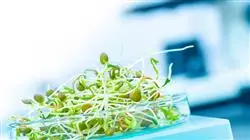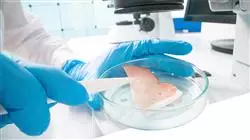University certificate
The world's largest faculty of nutrition”
Introduction to the Program
A 100% online Postgraduate diploma, flexible and with the most innovative content on Food Microbiological Risk Management”

Nowadays, there are many companies in the food industry that have quality certificates for their products, not only for the prestige it gives to the companies, but also for the compliance with the demanding regulations that must be applied throughout the whole process of elaboration and sale of a product.
However, the risk of finding bacteria or microorganisms in food that generate human illnesses continues to exist and is increasingly frequent due to globalization, contamination of natural resources or their scarcity. For this reason, properly managing these risks is key for the sector, which requires highly qualified professionals in this field. In this scenario, TECH has designed this Postgraduate diploma in Food Microbiological Risk Management, where the Nutrition professionals will be able to make an advanced tour of the main products of the Food Industry and the relevance of hygiene.
A program taught exclusively online, where the specialist can delve into the beneficial effects of microorganisms, control systems and process optimization or proper management of traceability in the food chain. All this by means of video summaries, videos in detail or complementary readings that will favor the progression of the students in a degree, which is at the academic forefront.
The professionals are, therefore, facing an excellent opportunity to update their knowledge thanks to a university education that can be accessed 24 hours a day from a computer, tablet or cell phone with Internet connection. In addition, the Relearning system, based on the reiteration of content, will allow students to reduce the hours of study. An ideal option for those who wish to combine a quality program with the most demanding responsibilities.
Access the most comprehensive and advanced knowledge on foodborne microbial diseases”
This Postgraduate diploma in Food Microbiological Risk Management contains the most complete and up-to-date scientific program on the market. The most important features include:
- The development of case studies presented by experts in Food Technology
- Graphic, schematic, and practical contents with which they are created, provide scientific and practical information on the disciplines that are essential for professional practice
- Practical exercises where self-assessment can be used to improve learning
- Its special emphasis on innovative methodologies
- Theoretical lessons, questions to the expert, debate forums on controversial topics, and individual reflection assignments
- Content that is accessible from any fixed or portable device with an Internet connection
You have access to a library of multimedia resources with which you can more easily delve into the development of new processes in the meat sector”
The program’s teaching staff includes professionals from the sector who contribute their work experience to this educational program, as well as renowned specialists from leading societies and prestigious universities.
Its multimedia content, developed with the latest educational technology, will provide the professionals with situated and contextual learning, i.e., a simulated environment that will provide an immersive education programmed to learn in real situations.
The design of this program focuses on Problem-Based Learning, by means of which the professionals must try to solve the different professional practice situations that are presented throughout the academic course. For this purpose, the students will be assisted by an innovative interactive video system created by renowned experts.
This course will allow you to keep abreast of the latest developments in the most commonly used techniques in food microbiology"

With this university qualification you will be able to know in depth the main requirements demanded by the ISO 22000 standard"
Why study at TECH?
TECH is the world’s largest online university. With an impressive catalog of more than 14,000 university programs available in 11 languages, it is positioned as a leader in employability, with a 99% job placement rate. In addition, it relies on an enormous faculty of more than 6,000 professors of the highest international renown.

Study at the world's largest online university and guarantee your professional success. The future starts at TECH”
The world’s best online university according to FORBES
The prestigious Forbes magazine, specialized in business and finance, has highlighted TECH as “the world's best online university” This is what they have recently stated in an article in their digital edition in which they echo the success story of this institution, “thanks to the academic offer it provides, the selection of its teaching staff, and an innovative learning method aimed at educating the professionals of the future”
A revolutionary study method, a cutting-edge faculty and a practical focus: the key to TECH's success.
The most complete study plans on the university scene
TECH offers the most complete study plans on the university scene, with syllabuses that cover fundamental concepts and, at the same time, the main scientific advances in their specific scientific areas. In addition, these programs are continuously being updated to guarantee students the academic vanguard and the most in-demand professional skills. In this way, the university's qualifications provide its graduates with a significant advantage to propel their careers to success.
TECH offers the most comprehensive and intensive study plans on the current university scene.
A world-class teaching staff
TECH's teaching staff is made up of more than 6,000 professors with the highest international recognition. Professors, researchers and top executives of multinational companies, including Isaiah Covington, performance coach of the Boston Celtics; Magda Romanska, principal investigator at Harvard MetaLAB; Ignacio Wistumba, chairman of the department of translational molecular pathology at MD Anderson Cancer Center; and D.W. Pine, creative director of TIME magazine, among others.
Internationally renowned experts, specialized in different branches of Health, Technology, Communication and Business, form part of the TECH faculty.
A unique learning method
TECH is the first university to use Relearning in all its programs. It is the best online learning methodology, accredited with international teaching quality certifications, provided by prestigious educational agencies. In addition, this disruptive educational model is complemented with the “Case Method”, thereby setting up a unique online teaching strategy. Innovative teaching resources are also implemented, including detailed videos, infographics and interactive summaries.
TECH combines Relearning and the Case Method in all its university programs to guarantee excellent theoretical and practical learning, studying whenever and wherever you want.
The world's largest online university
TECH is the world’s largest online university. We are the largest educational institution, with the best and widest online educational catalog, one hundred percent online and covering the vast majority of areas of knowledge. We offer a large selection of our own degrees and accredited online undergraduate and postgraduate degrees. In total, more than 14,000 university degrees, in eleven different languages, make us the largest educational largest in the world.
TECH has the world's most extensive catalog of academic and official programs, available in more than 11 languages.
Google Premier Partner
The American technology giant has awarded TECH the Google Google Premier Partner badge. This award, which is only available to 3% of the world's companies, highlights the efficient, flexible and tailored experience that this university provides to students. The recognition as a Google Premier Partner not only accredits the maximum rigor, performance and investment in TECH's digital infrastructures, but also places this university as one of the world's leading technology companies.
Google has positioned TECH in the top 3% of the world's most important technology companies by awarding it its Google Premier Partner badge.
The official online university of the NBA
TECH is the official online university of the NBA. Thanks to our agreement with the biggest league in basketball, we offer our students exclusive university programs, as well as a wide variety of educational resources focused on the business of the league and other areas of the sports industry. Each program is made up of a uniquely designed syllabus and features exceptional guest hosts: professionals with a distinguished sports background who will offer their expertise on the most relevant topics.
TECH has been selected by the NBA, the world's top basketball league, as its official online university.
The top-rated university by its students
Students have positioned TECH as the world's top-rated university on the main review websites, with a highest rating of 4.9 out of 5, obtained from more than 1,000 reviews. These results consolidate TECH as the benchmark university institution at an international level, reflecting the excellence and positive impact of its educational model.” reflecting the excellence and positive impact of its educational model.”
TECH is the world’s top-rated university by its students.
Leaders in employability
TECH has managed to become the leading university in employability. 99% of its students obtain jobs in the academic field they have studied, within one year of completing any of the university's programs. A similar number achieve immediate career enhancement. All this thanks to a study methodology that bases its effectiveness on the acquisition of practical skills, which are absolutely necessary for professional development.
99% of TECH graduates find a job within a year of completing their studies.
Postgraduate Diploma in Food Microbiological Risk Management
Food microbiological risk management is an essential discipline in the food industry to ensure the safety and quality of the products that reach our tables. Being such a relevant area today, TECH Global University developed the Postgraduate Diploma in Food Microbiological Risk Management as an excellent opportunity for qualification in the area, without having to leave home. This completely online program will add to your curriculum the most updated competencies in the market so that you can perform effectively in the field of microbiological risk management. During the training, you will study the main microbiological hazards associated with food such as pathogenic bacteria, viruses and parasites. In addition, you will analyze the methods of detection, prevention and control of these threats, focusing on international best practices and regulations.
Learn about microbiological food risk management
One of the key objectives of the program is to train you in the identification of critical control points and the implementation of food safety and quality management systems. Topics such as hazard analysis and critical control points (HACCP), good manufacturing practices (GMP) and prerequisite programs will be addressed, ensuring that you acquire the necessary skills to design and maintain a safe and sanitary production environment. In addition, you will delve into the importance of communication and education in microbiological food risk management. From this, you will learn how to effectively convey food safety practices both internally, within organizations, and externally, educating consumers on the importance of proper food handling and storage.







